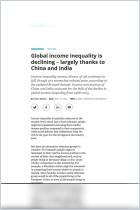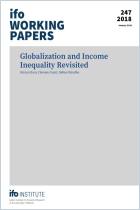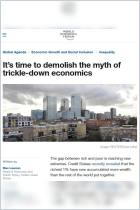Join getAbstract to access the summary!

Join getAbstract to access the summary!
Dani Rodrik
Is Global Equality the Enemy of National Equality?
Dani Rodrik, 2017
What's inside?
Improving labor mobility can help reduce global income inequality.
Recommendation
Harvard professor of international political economy Dani Rodrik elucidates the dynamics of global and national income inequality and addresses pragmatic solutions to ongoing imbalances in this somewhat esoteric but ultimately rewarding analysis. getAbstract recommends this authoritative report to policy makers, analysts and executives interested in the nuances of national and international inequality.
Summary
About the Author
Dani Rodrik is a professor at Harvard University’s John F. Kennedy School of Government.
























Comment on this summary